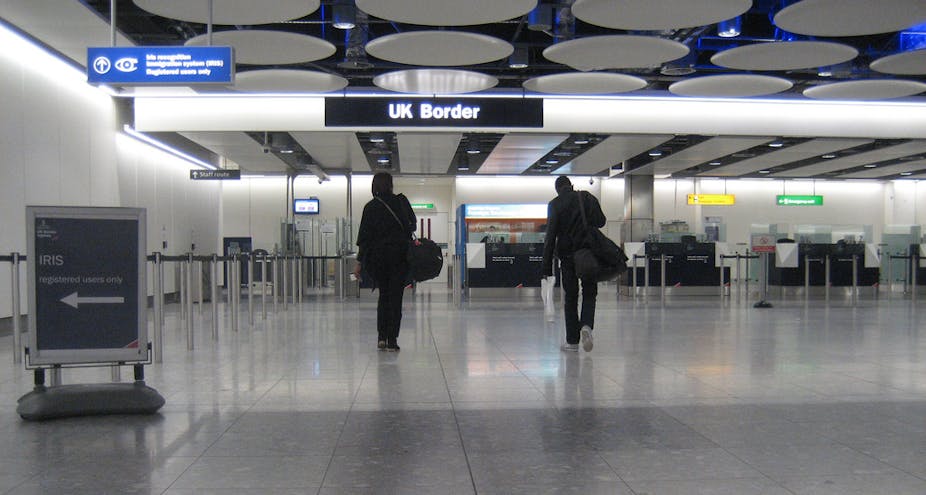The UK has taken a bad turn in its attitude towards foreigners. I am a Portuguese national doing biomedical research for the NHS and King’s College London in collaboration with very talented staff from all over the world. In my view, the current political discourse against immigration is not conducive to this country being able to attract, maintain and benefit from talented and hard-working people.
This is true in all fields but in particular for the UK’s academic and research force which relies heavily on international migration.
We are in the middle of an unprecedented financial crisis which, according to Bank of England economist Andrew Haldane, caused a fall in real wages that is “unprecedented since at least the mid-1800s”. Yet both the prime minister, David Cameron, and his opposite number, Ed Milliband have taken the view, prompted by the threat from UKIP – and against most available evidence, that one of the biggest threats to the well-being and prosperity of the British voter is the fact that people like me who were born elsewhere come to work in the UK.
Immigration clampdown
The Coalition’s insistence on counting students as part of its target for net migration – the number of people coming into the country, minus the number going out – continues to cause heated debate. A clampdown on the way student visas are awarded has drawn criticism from the House of Lords and university vice-chancellors. Andrew Hamilton, a vice-chancellor at Oxford, called the UK visa system “hostile to student entry”.
But this hostile climate affects not only students but also research and academic staff. The 2014 Nobel Prize-winning neuroscientist John O’Keefe – an American academic working at University College London – publicly said that the UK’s immigration policy is “a very, very large obstacle” to attracting the best scientists.
He suggested that “we should be thinking hard about making Britain a more welcoming place”. How would you feel to be working for an company where the management constantly promises to reduce the number of employees of your kind? It’s the situation us migrants are facing in Britain.
Globalised universities
Looking at the composition of the UK’s elite universities really shows how much this country is drawing on world talent. Students and staff from all over the world create a uniquely qualified and talented resource for UK universities.
For example, I work among six PhD-level scientists doing bioformatics analysis with numerous Kings College London (KCL) academics and NHS doctors. In our team, four are non-British EU nationals (with PhDs awarded elsewhere) and one is non-EU national (with a PhD from a British university). Our goal as “translational scientists” is to make current advances in medical biomedical technology applicable to the healthcare of the nation. We work on cancer treatments, immune diseases, transplantation among other areas.
In fact, much of the success of UK universities and science is built around migration. Consider how many non-UK academic staff work at some of this country’s top institutions. The graph belows shows the percentage of non-UK academic staff (including Europeans) in a selection of top universities, based on data I requested from them.

Across Oxford, Cambridge, University College London, KCL and the London School of Economics, more than 30% of research and academic staff (excluding PhD researchers) are not originally from the UK.
Data from the Higher Education Statistics Agency also shows that across the sector, 25.8% of academic staff were from outside the UK in 2012-13. In total, 14.4% were from the EU. The proportion of non-EU staff has remained steady over the last four years at just over 11% of the total academic population.
While there is no specific threat to academics’ own visas, they are not being encouraged to work here by the strong anti-immigrant feeling in the country and the Coalition’s net migration targets.
Economic benefits
Evidence continues to mount about the benefits of immigration to the UK economy – about £25 billion of net contribution to public finances between 2001 and 2011, according to research from UCL.
Universities are not only a significant sector of the UK economy, they are also a unique, high-quality investment in the future prosperity and quality of life in the UK. International students and academics are big contributors to that. Universities UK has estimated that non-EU students pay £3.2 billion in tuition and non-UK student off-campus expenditure generates £7.37 billion of output and more than 62,000 jobs for the UK economy.
Science research operates in a sector where competition for talent is fierce. With the general election approaching in 2015, if Britain’s politicians insist on dialling up the hostile attitude to foreigners and do not follow O’Keefe’s advice, then there are other places who will more happily welcome the benefits of immigration.
Next read: Universities lack the lobbying clout to exempt students from migration target

